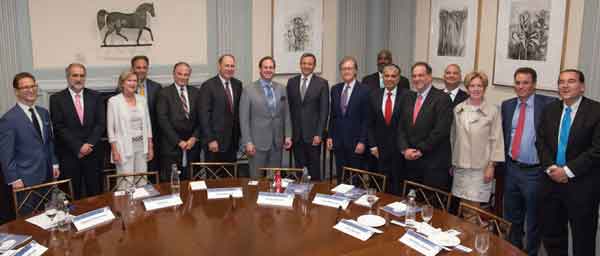
Heated public debate surrounding renewal of the Export-Import Bank charter, which expires at the end of September, makes clear that concerns about giveaways to connected corporations have reached a boiling point in the United States. Conservatives point to Solyndra and the Ex-Im Bank while progressives point to powerful lobbying by wealthy companies, such as Boeing and General Electric, as evidence that the relationship between government and business has crossed the line well beyond benign partnership.
Meanwhile, the average citizen, soured by declining real personal income, has become increasingly cynical regarding a system that appears to benefit the big, corporate elite at the expense of small enterprise. “Since 2009, growth has been appalling and these people are struggling. Meanwhile, Wall Street is up. That’s what makes people susceptible to the idea that the system is rigged,” Lawrence Mone, president of the Manhattan Institute, told participants at a CEO roundtable at the New York Stock Exchange in July.
But they’re not necessarily wrong, said Tom Rogers, president and CEO of TiVo. “I don’t think the public is confused. They see it clearly. There’s a reason there is a 9 percent Congress approval rating,” he said, noting that the issues CEOs are facing around growth don’t make it into the public light. “You can draw a pretty straight line from contributions to committees and the positions on those committees.”
As a result of one-sided media coverage, Main Street continues to view capitalism as corrupt. “All we read about in the paper is who is getting fined for what and who is being investigated for what. It’s just negative about business altogether. You don’t see the positives, and that’s a major issue for this country,” said Maggie Wilderotter, CEO of Frontier Communications.

Chief Executive Group exists to improve the performance of U.S. CEOs, senior executives and public-company directors, helping you grow your companies, build your communities and strengthen society. Learn more at chiefexecutivegroup.com.
0

1:00 - 5:00 pm
Over 70% of Executives Surveyed Agree: Many Strategic Planning Efforts Lack Systematic Approach Tips for Enhancing Your Strategic Planning Process
Executives expressed frustration with their current strategic planning process. Issues include:
Steve Rutan and Denise Harrison have put together an afternoon workshop that will provide the tools you need to address these concerns. They have worked with hundreds of executives to develop a systematic approach that will enable your team to make better decisions during strategic planning. Steve and Denise will walk you through exercises for prioritizing your lists and steps that will reset and reinvigorate your process. This will be a hands-on workshop that will enable you to think about your business as you use the tools that are being presented. If you are ready for a Strategic Planning tune-up, select this workshop in your registration form. The additional fee of $695 will be added to your total.

2:00 - 5:00 pm
Female leaders face the same issues all leaders do, but they often face additional challenges too. In this peer session, we will facilitate a discussion of best practices and how to overcome common barriers to help women leaders be more effective within and outside their organizations.
Limited space available.

10:30 - 5:00 pm
General’s Retreat at Hermitage Golf Course
Sponsored by UBS
General’s Retreat, built in 1986 with architect Gary Roger Baird, has been voted the “Best Golf Course in Nashville” and is a “must play” when visiting the Nashville, Tennessee area. With the beautiful setting along the Cumberland River, golfers of all capabilities will thoroughly enjoy the golf, scenery and hospitality.
The golf outing fee includes transportation to and from the hotel, greens/cart fees, use of practice facilities, and boxed lunch. The bus will leave the hotel at 10:30 am for a noon shotgun start and return to the hotel after the cocktail reception following the completion of the round.